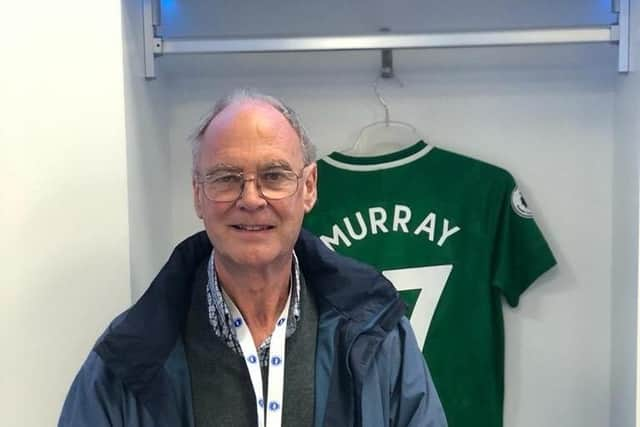Alzheimer’s Society launches guide to create dementia-friendly sports in Sussex
and live on Freeview channel 276
The new dementia friendly sports club and venue guide is designed to support clubs and organisations to make their venues more accessible for people affected by the progressive condition.
Giving supporters living with dementia a smooth journey from sofa to stands, the guidance is for venues of all sizes to ensure fans with dementia are supported, understood and know where to get help on gamedays.
Advertisement
Hide AdAdvertisement
Hide AdAlzheimer’s Society has worked alongside people living with dementia to produce the guidance, which provides practical advice and recommendations to venues from all sports and levels on how to make their facilities and practices dementia friendly.


The charity collaborated with clubs that have already implemented dementia-friendly procedures including Brighton and Hove Albion.
There are 900,000 people with dementia across the UK, enough to fill Amex Stadium 30 times.
John Pinkney is a Brighton and Hove Albion season ticket holder and has gone to games with his son since the 1980s.
Advertisement
Hide AdAdvertisement
Hide AdHis son Jonathan said that despite living with dementia, John remembers the words to every chant.


He said: “We drive to matches but took public transport before, which is not possible nowadays. We went by bus once after his dementia diagnosis but it proved tricky as he gets anxious if it is busy, especially when queueing and would walk off.
“Using the bathroom is difficult for dad with crowds at half time, so we wait until after the second half begins. We used to arrive at the stadium an hour early to watch the warm-up and eat a hotdog. But now get there 30 minutes before and head to our seats. When the team walk out to Sussex by the Sea, he starts singing and stays engaged for the first half.
“Half-time arrives and his recollection of the first half is a little fuzzy, but after the interval he is back concentrated on the game. It is great because for 90 minutes, it’s just dad being dad like he always was. Then we leave the ground at the final whistle and he goes back to being confused and anxious.
Advertisement
Hide AdAdvertisement
Hide Ad“There is a season ticket holder next to us and dad greets him like an old friend! Upon returning to the Amex Stadium after the pandemic break, our neighbour came up and my dad greeted him by name which was lovely to see.
“Dad can’t be left alone and on the few occasions I have needed support from Brighton’s stewards, they have been so supportive. I know it is part of moving with the times and modernising but the club went contactless so cash is not accepted, and season tickets are on smartphones. My dad always bought a pre match programme but can’t carry credit cards, so I buy them. Other people wouldn’t care about little things like that, but my dad does.
“My children are young and never saw my dad as I knew him. Although it is nice to think their memories of him in future will be happy ones from watching football altogether. What Alzheimer’s Society are doing with the venue guidance is fantastic. It is important for people with dementia to continue living their lives and enjoying their hobbies for as long as possible.”
Brighton and Hove Albion have an inclusion room used by fans with dementia on matchdays, host reminiscence sessions with former players and run a separate queue at the nearby train station for supporters with accessibility requirements.
Advertisement
Hide AdAdvertisement
Hide AdEvery steward and frontline staff member is trained in disability awareness, while the club operate a hidden disability wristband scheme that is used by more than 300 supporters.
The introduction of the guide has resulted in the Premier League and Racecourse Association pledging their commitment to become dementia friendly.
Alzheimer’s Society Area Manager for Sussex, Carrie Holmes said: “Sport should be unforgettable and have no boundaries. It can provide a universal language for young and old alike. The colours, laughter, camaraderie and emotion, a relationship with sport can last a lifetime. Providing an inclusive and accessible environment for people with dementia is not just about practical changes. Its creating a culture both in and outside the organisation as shown by Brighton and Hove Albion.
“Sports clubs help people affected by dementia retain their sense of purpose, dignity and allow them to maintain a good quality of life. Small changes such as increased signage, offering quiet spaces, changes to ticket policies, seat allocation near accessible facilities and staff training can result in significantly better experiences for spectators.”
Advertisement
Hide AdAdvertisement
Hide AdA veteran season ticket holder with dementia might feel like they are attending for the first time, every time they visit. That shows why clear and bold signage can help them to better understand and navigate their surroundings.
With short-term memory often impacted matchday difficulties can include losing tickets, forgetting where their seat is, navigating their way to the ground via public transport and turning up at the wrong time. Feelings of confusion and disorientation are common, while many with dementia report feeling frustrated asking for food at kiosks as they struggle finding the right words.
Symptoms for people with early-onset dementia can appear as drunkenness, leading to problems in stadiums when stewards misread a situation. For other spectators with dementia, complications begin before match day as using technology and accessing online information can be challenging.
Carrie continues: “People with dementia are often forced to give up the things they have always enjoyed, such as watching live sport because of inaccessible environments. Sport plays an important role in keeping people connected within their communities, creating new memories or revisiting old ones.”
Advertisement
Hide AdAdvertisement
Hide AdAlzheimer’s Society’s Sport United Against Dementia (SUAD) campaign provides hope for future generations through research and is transforming the way sport supports people affected by dementia, so no player, former player or fan faces dementia alone. You can find out more about the campaign by visiting alzheimers.org.uk/SUAD